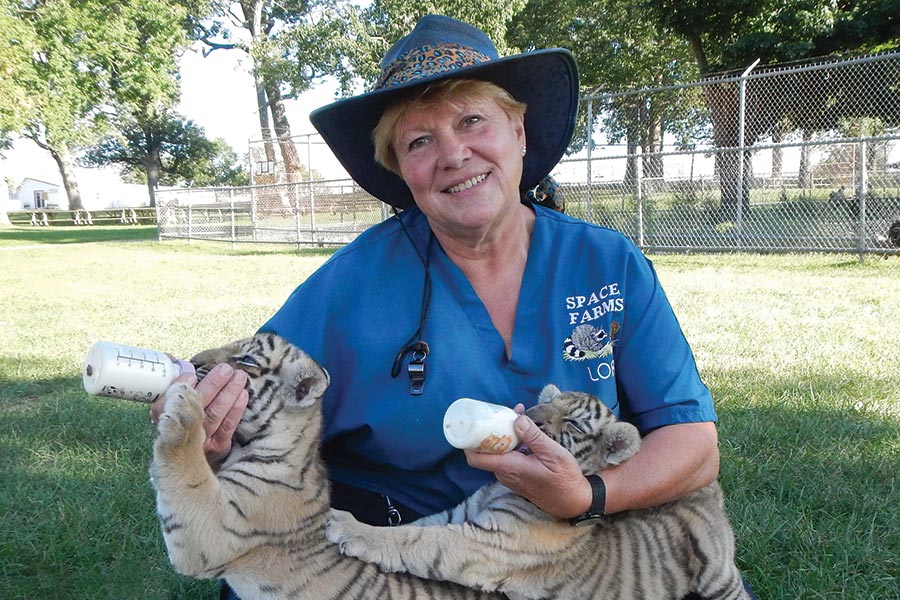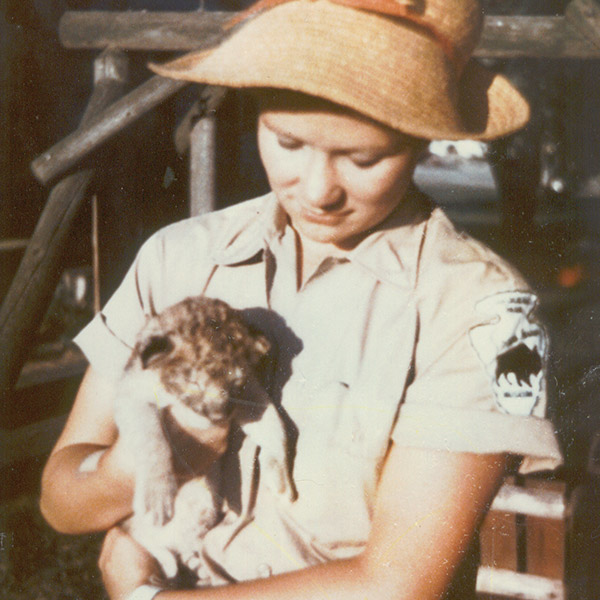THEIR LIFE'S WORK
Zoo Momma
Bottle-feeding tigers is all in a day's work for zoologist Lori Space Day '80.
by Robin L. Flanigan

Lori Space Day ’80 was born into the zoo business. Before school she would spend two hours carrying buckets of water, cleaning cages and making sure the animals had enough hay, only to return home and resume those chores until dinnertime.
“I always loved it,” she says.
Of course, back in the 1950s when her grandfather converted his trapping business into a zoological park, animals were kept on concrete slabs with steel bars. Now the 100-acre Space Farms Zoo & Museum in Wantage, N.J., with some 500 wild animals and more than 100 species, features natural turf and grass and organic-looking caves.
“I’ve raised just about everything we have at the zoo,” says the third-generation zoologist and former biology major, who takes care of the animals, manages employees, and is in charge of public relations. The zoo attracts approximately 100,000 people in a good year.
“The animals give me no trouble,” she adds. “The visitors are the hardest part.”
From March through June, when most of the animals are born, Space Day starts her mornings with feedings around dawn “or whenever they holler enough to wake me up.” She keeps the babies (including Mouflon lambs, farm lambs, fawns, calves, foxes, and woodchucks) in cardboard boxes in the mudroom of her farmhouse, on zoo grounds. “Just like with human babies—you don’t wake them up.… And every species has its own formula, so I don’t use the milk in my refrigerator without reading the label first!”
She feeds them every two hours, between cleaning nursery enclosures, greeting buses of schoolchildren, helping sell souvenirs, and other duties. For larger babies such as llamas and Assateague ponies, she heads to their enclosures in her pajamas for feedings before her morning coffee.
This is how she develops a relationship that is difficult to sever when it’s time to send an animal to another zoo, a standard practice and an important step in maximizing the gene pool for endangered species.
Space Day says she vets new zookeepers over the phone and has visitation rights but trading animals never gets easier: “The worst part of my job is having to drive an animal to the airport, then leaving it, and not knowing for four to five hours whether it got to its destination.”
In two self-published memoirs, The Zookeeper’s Daughter and Zoo Momma, Space Day chronicles stories about daily animal care, medical procedures, and the adventures that come with being surrounded by wild animals. (Like the time a bull elk got loose and had to be chased back to its home.)
She has help from her family. Her brother, husband, sister-in-law, and nephew all work at the zoo; her father, now 88, shows up at 8 a.m. to set up his chair by the admission gate, ready for questions from visitors, who call him “Pop.”
No matter how many years go by, Space Day continues to be inspired by all sorts of animals, whom she considers among her greatest teachers.
“They’ve taught me how to accept things that are different than I am,” she says. “That not everybody has two hands and two feet, but that we all basically need the same things—food, shelter, water, and a mate we want to love and protect.”
Robin L. Flanigan is a writer in Rochester, New York.
